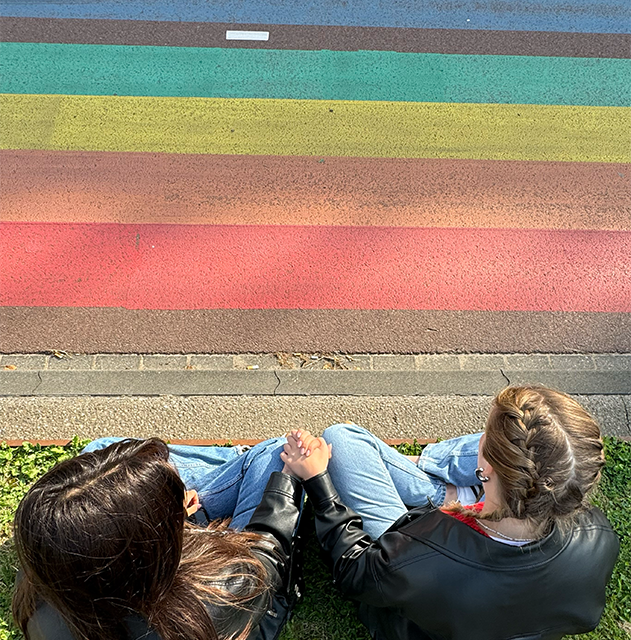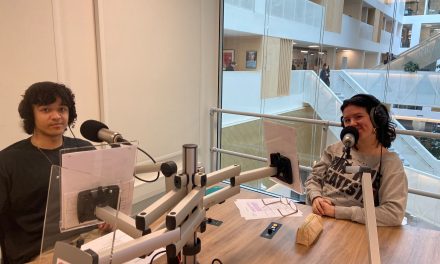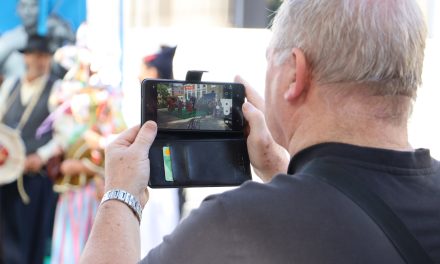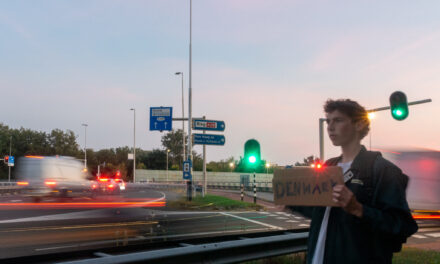On September 2nd, Hogeschool Utrecht (HU) welcomed its students with a powerful statement of inclusion: a 570-meter-long rainbow bike path, the longest in Europe. Designed to symbolize diversity and acceptance, this colorful pathway reflects the university’s commitment to creating a welcoming environment for all, in line with the EU’s Gender Equality Strategy (2020–2025), which promotes equal rights for LGBTQ+ individuals across Europe. But how far can symbols like these influence real change on campus?
“Symbols like this are important, yes, but we also need concrete actions to make sure that this message is reflected in everyday campus life.” – says Felix van Vugt, board member of the Gender and Sexuality Alliance (GSA) at Hogeschool Utrecht. He, along with his colleagues Annemiek Broersen and Marlies de Vos, founded the first Gender Sexuality Alliance in the Netherlands.
Diversity and Inclusion Network
The GSA is a part of the Diversity and Inclusion Network at HU, with two primary goals: making the community feel at home and raising awareness more widely. From a small voluntary initiative to an organization with 160 members: The growth of the GSA has been made possible through financial support of the ‘HUGS’. This funding ensures that events such as ‘Coming Out Day’, ‘Purple Thursday’ and participations in Pride activities, including the rental of a pride boat will continue to take place. However, it also shows that real progress needs concrete actions and financial support.
Ally Up
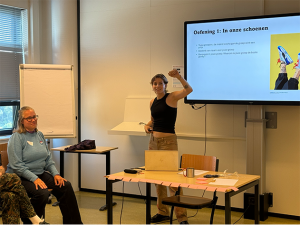
Workshop: Us vs. Them – Connecting in a Divided Society – Jessie van Samsbeek of GSA Hogeschool Utrecht
One of the most ambitious projects the GSA is working on right now is called ‘Ally Up’, trying to encourage allies to take actions. “We need more role models in education, we need people to speak up and we do need allies.” – emphasizes van Vugt. The project follows a ‘train the trainer model’, trying to not only reach people within the Diversity and Inclusion Network but also students and staff across the university. The project educates participants on the importance of pronouns and how they can contribute individually to an inclusive campus culture.
Concrete Progress
There have already been important steps forward. Hogeschool Utrecht now allows students and employees to choose non-binary gender markers, such as ‘X’ in the university´s system canvas, as well as select their pronouns or change their first name. Even though time and resources are limited, these recent developments show that meaningful progress is being made.
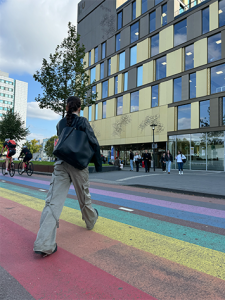
Next steps
Significant progress has been made in recent years, however, there is still a long road ahead. The GSA recently hosted the second ‘Fresh start’ event, an initiative aiming to spread the GSA´s mission beyond Utrecht and across the Netherlands. Although the Netherlands is considered progressive in terms of LGBTQ+ rights, there are still challenges which need to be faced. It would be inaccurate to consider the Netherlands as a complete leader in LGBTQ+ rights. However, other European countries could learn from these local initiatives and adopt similar approaches to create inclusive environments.
Shay, a queer international student, says: “Seeing the rainbow outside HU shows me I’m in a space that accepts my lifestyle and the LGBTQ+ community. Knowing there’s a group I can turn to for support or to meet like-minded people is amazing!”
While symbols like the rainbow bike path are important first steps, real progress lies in the actions being taken to create an inclusive environment for all. Hogeschool Utrecht is setting an example through its efforts to move beyond symbolic gestures. As the EU continues to push for LGBTQ+ equality by 2025, initiatives like the GSA in Utrecht show what can be possible.
